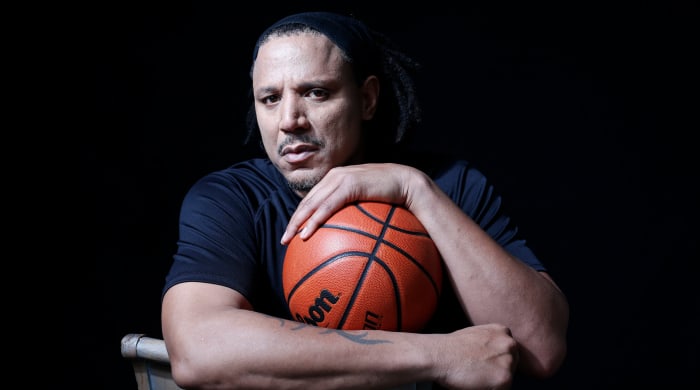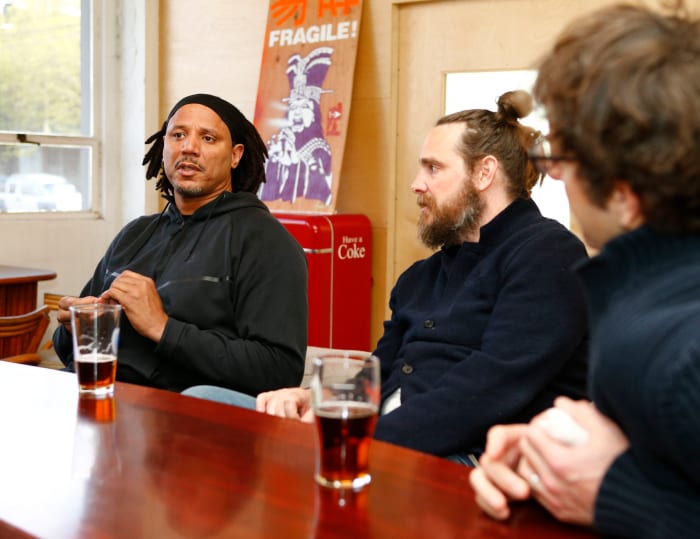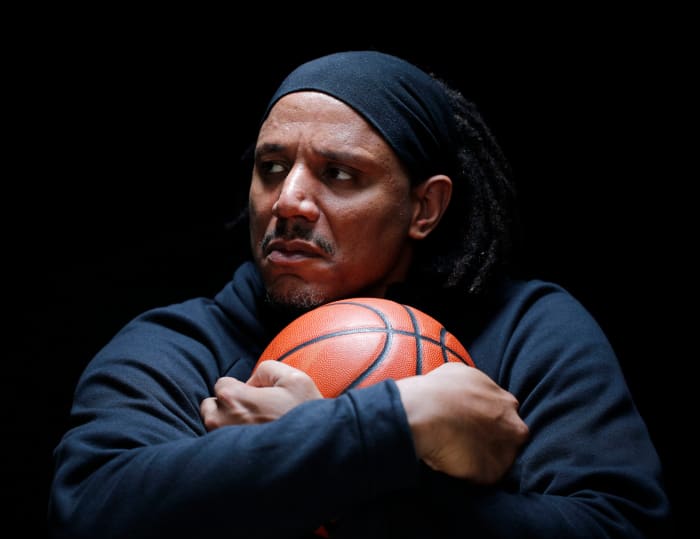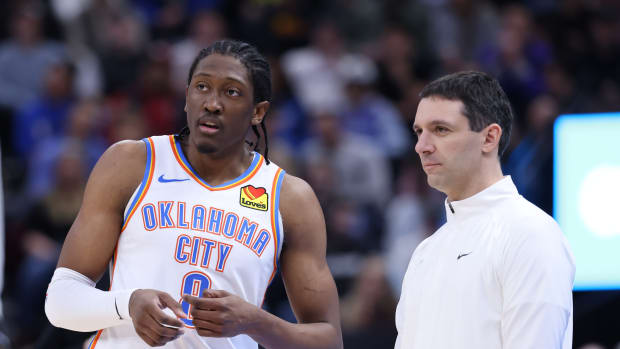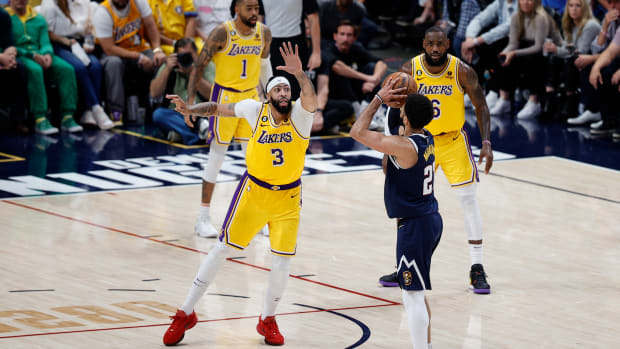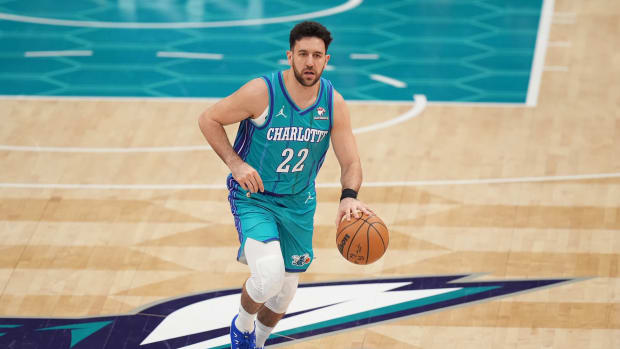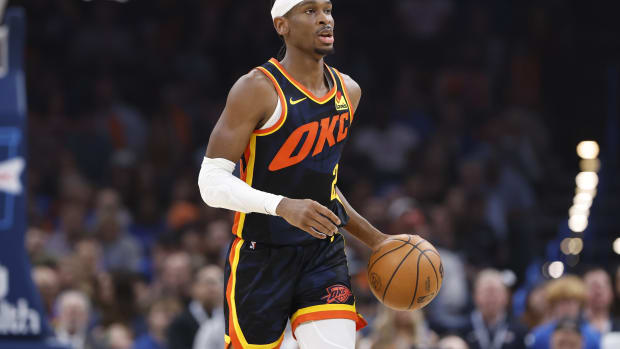Same Warrior, New Battle: Brian Grant Won't Back Down From Parkinson's Disease
He could hear the roar from the back hallway of the Rose Garden, the clatter of 20,000 fans.
For years, Brian Grant had fed off that roar, back when Blazers fans wore T-shirts that read "Rasta Monsta" and embraced him as they had few others. Never the fastest, biggest or most skilled, Grant got by on hustle and desire. What was it Tim Duncan once said? "Hardest-working guy in the league. You've got to respect that cat." And Grant took pride in that. On playing an entire season with a torn labrum. On never backing down, whether it was guarding Karl Malone or levering his 6'9" frame into Shaquille O'Neal. On trying harder than anyone else. He got out of Georgetown, Ohio, by trying; survived 12 years in the league by trying; tore up both knees by trying.
But now, standing in that concrete corridor on a November night in 2008, two years after his final NBA game, Grant felt only fear and anxiety. He was there to honor an old friend, former Blazer Kevin Duckworth, who'd died of heart failure at 44. All Grant needed to do was be present. Wave, bow his head, pay his respects. And yet he'd already sweated through his white undershirt, the perspiration breaching his blue button-down and threatening his navy blazer. He thought about ducking into the bathroom to towel off, maybe even bolting the arena.
Space City: How Faith Fuels the Rockets' Explosive Offense
He worried the crowd would notice his unsteady gait, how he jammed his left hand in his jeans pocket. Even more, he feared the reaction of his peers. They knew Grant as a warrior. A fighter. Now? Now Grant was ashamed of what he'd become. What if these men thought him weak? Or worse, pitied him?
Don't drive yourself crazy thinking about it. That's what the neurologist in Miami had said a year earlier, when the flicker in Grant's left wrist had turned into something more like a tremor. Your symptoms could indicate something serious, but they could also be a hundred other things. After all, Grant was an elite athlete who'd endured years of wear and tear. His body was apt to do weird stuff—just as he had figured that the depression that had descended like a heavy cloak was only temporary. So he had taken Wellbutrin, gone to therapy, and tried his best to ignore the shaking.
But this kind of fear was too much. He needed to know if he was just imagining everything or if his symptoms had a name. What if they were somehow his fault? What if they never went away?
A few months later he sat in the office of Dr. John Nutt, a neurologist at the Oregon Health & Science University. As Nutt spoke, Grant heard his words, but it would take hours—weeks, months, years, really—for their full weight to register.
That, at 36 years old, he had Parkinson's disease.
A memory: Brian is seven years old and lying on the couch at his grandmother's house. He feels terrible. Coughing. Shivering. His grandmother starts the pilot light, but maybe it doesn't vent right, and smoke pours in. The cough becomes a hack. She hurries him to the hospital. Double pneumonia. He is sequestered in a plastic tent for weeks, scared and lonely. When he finally goes home, the doctor says Brian is lucky he survived.
His mom, Dorella, is relieved. Then again, surviving is what Grants do. She had Brian when she was 18. A brother followed three years later, then a sister. They crammed into a two-room trailer by the post office in Georgetown, one of the few black families in a town of 3,000 southeast of Cincinnati. Brian's father, Tommy, had joined the Marines, and they'd moved, base to base—California, North Carolina—before returning to Georgetown, where Tommy worked odd jobs. Dorella believed he was a good man, but Tommy drank too much and cheated on her. By his teens, Brian had two half sisters and a half brother. He accepted them; it took a long time to forgive his father.
Dorella was the one who kept the family going, working up to 12 hours a day at the Mac factory, assembling hulking mechanical toolboxes, fitting each roller bearing and drawer just so. The job paid $17,000 a year, enough to buy the kids clothes, even get a VCR so they could watch Purple Rain and American Werewolf in London.
By 11, Brian had joined his cousins in baling hay, digging potatoes and dropping tobacco sticks, forever on the lookout for snakes. On good days they made three bucks an hour. The message should have been clear: To make it in this world, you had to work. Otherwise, you might end up like some of his relatives and family friends, unemployed, boozing and fighting, scraping by, making excuses. And yet, by his teens, that's where Brian appeared headed. "Lazy," he says now. Chasing girls. Drinking. Sure, he looked like a ballplayer, sprouting from 5'10" to 6'4" during his freshman year, but that was the extent of it. "Growing up, you were upset if he got stuck on your team," says Jermaine Marshall, one of Brian's cousins. "We could all beat him at one-on-one."
Not that people didn't try to motivate Brian. The old heads at the park down in Ripley, having heard that he'd been kicked off the Georgetown High team for being a knucklehead, took it to him: forearms, elbows, shoves to the pavement. One night after the games, Kent Brooks took Brian and a couple of the other park vets out in his El Dorado. Brooks had just missed his own shot at college. He bought a round of Budweiser 40s, handing one to Brian. Brooks let him have a sip before he lit into him.
You got an opportunity, but you just gonna waste it. You come back here and play soft again, and we gonna f--- you every Sunday.
When the light clicked on, during Brian's senior year—when he finally made use of that body—he became a beast. Dunking, grabbing every rebound. Refusing to be outworked or outhustled. That's how he got noticed by Xavier, where he earned honorable mention All-America honors. How he caught the eye of NBA scouts. How he got drafted eighth by the Kings in 1994, after putting up 20 and 20 in predraft camps to prove to GMs that he wasn't undersized. That desire can trump heft.
Desire might not be the right word, though. Chuck Terrell, one of Brian's best friends, describes it this way: "Brian's advantage is that he's f------ crazy. He wasn't blessed with the best jumping ability. Plenty of dudes had more talent, but they didn't apply themselves like he did. He'd lose himself out there on the court and play with an intensity that forced everyone around him to play like that."
After blossoming into a dependable two-way player, in 1997 he signed as a free agent with Portland, where on a team derisively known as the Jailblazers, Grant stood out. Hardworking, selfless, community-minded. Motivated by the memories of that plastic tent and that feeling of helplessness, he began a foundation, organized bone marrow drives, arrived at the Ronald McDonald House in a Hummer packed with food. He became a persistent presence at local hospitals. When Brian first visited Dash Thomas, a 12-year-old with glioblastoma, Dash's mother, Robin, didn't expect all that much. But Grant made the 90-minute round trip again the following weekend, and regularly after that for eight months. He played video games with Dash and took him and his buddies to the arcade and treated him like a peer. When Dash passed, in February 1999, Brian flew in for the funeral and sat in the front row. ("It meant so much to us," says Robin.) Afterward, Brian scrawled the boy's name on his shoes. That year, the NBA honored Grant with its J. Walter Kennedy Citizenship Award. "He plants trees of hope wherever he goes," is how Miguel Reyes, the father of another terminally ill child Grant befriended, put it to The Miami Herald when Grant left the Blazers for Miami. "I hope your city realizes what you are getting."
How Damian Lillard Redefined the Meaning of 'Dame Time'
If Portland was where Grant found his groove, growing out his dreads after a trip to Jamaica and learning from vets like Scottie Pippen, Miami was where he found his basketball purpose. He'd had no intention of signing with the Heat, having heard that Miami was nice but he'd have no time to enjoy it. That Pat Riley would run you into the ground. But then, in the summer of 2000, Riles fixed him with that stare and gave him the speech: about how he could make the Heat better, and the Heat could make him better, and how some people are scared of hard work, but not Brian. Brian was hard work. It was "like putting lighter fluid on a fire," says Brian's agent, Mark Bartelstein. Grant had yearned for structure, and now he'd found it. Ignore the giant free-agent offers, he told an incredulous Bartelstein. I want to sign for whatever it takes to play for Riley. (To his credit, Riley kept his end of the bargain, arranging a trade to get Grant an $86 million contract.)
Then, before the season, Heat center Alonzo Mourning announced he had kidney disease, which meant Grant had to guard the league's behemoths, including Shaq. On those nights Grant stalked the hallways of American Airlines Arena before the game, shouting and swearing, spittle spackling the walls as he imagined Shaq saying and doing horrible things to him, his wife and his mother. Teammates steered clear of Grant. But it worked. He'd allow Shaq a dunk or two early but then forced him to sprint to catch him in transition every time, wearing the big man out. As Riley says, "Once he got on the court, Brian always controlled that anger. It's part of what made him so good."
Grant missed a ring in Miami by two years, then made it a season in L.A. and one in Phoenix, as much coach as player by that point. He endured 10 surgeries in all: right knee four times, left knee twice, right shoulder three times and one hernia. He downed Naprosyn, Cataflam, Vicodin. Some nights he'd need acupuncture just to fall asleep. In a weird way, though, Brian took pride in the pain. It meant he'd lived, and thrived, in the trenches.
Parkinson's was different, a frailty thrust upon him, not earned, one that came with no honor, and less control. Grant had made his body do things few people could imagine. Now he couldn't stop his hand from trembling.
In time, Grant would learn all about the disease. That only 5% or so of those afflicted are under 40. That no one knows its cause. That these days most people die with Parkinson's, not from it, at least if they have the resources and desire. That the disease is both everywhere and nowhere, because while 60,000 people are diagnosed every year, and roughly 10 million live with Parkinson's worldwide, most do their best to hide it. Until they can't. Then they hide themselves.
He'd also learn that some in the medical community believe depression is a precursor. Because while Parkinson's is commonly thought of as a malady of the body, it's also a disease of the mind, infiltrating the brain and messing with the control levers. Neurons begin to malfunction and then die off, reducing the supply of dopamine, a substance that controls movement. Neurons that make serotonin and norepinephrine are also affected, making it more difficult for some to feel joy or empathy.
For Brian, this helped explain those early months, just after his retirement from the Heat, when the darkness first descended. At the time he told himself he was letting his body heal. So he slept in. Ate big meals. Avoided the gym. Gained weight. But instead of enjoying the good life, he felt restless. He tried attending the Heat home opener but couldn't stand the lights and noise and the feeling of being on the outside looking in. Pat Riley had warned him about this. Letting go is hard, Riles told him. Golf won't be enough. Fishing won't be enough. You've got half your life ahead of you. You need a plan.
But Grant had none. He sank into the couch in his fourth-floor condo in Coral Gables, feet propped on the ottoman, TV blaring, giant Tupperware bowl of Crunch Berries on his lap, telling himself that because he used 2% milk, it was O.K. to eat the whole box. He watched whatever was on, even stuff he used to hate, like hunting shows. Hours stretched into days, with Grant rarely leaving the house. He became ornery, snapping at Gina, his wife of 14 years, and avoiding their three kids. Grant had always been chill. Fun. An engaged father. The guy with the huge laugh and the big heart. "A good man," says Riley.
'These Tragedies Have to Stop.' Inside the Kings' Decision to Stand Up for Stephon Clark
But that man was gone. Grant stopped calling friends and hid out. That winter Dorella flew down from Ohio. She was shocked by what she found. Brian was angry and aloof. He ranted, sure someone was on the roof, out to get him. "It was horrible, absolutely horrible," she says. "He wouldn't get up, wouldn't do anything. Just wanted to sit there. I'd watch him and think, This isn't the son that I know."
A cruel irony existed. Here was a man who, as a player, had been unusually empathetic toward those who were sick. But now that he was sick, he had no idea what to do or how to care for himself.
It took a toll. Gina had put up with a lot over the years, made sacrifices, forgiven him for being unfaithful. But this was too much. "Either you go see a doctor," she finally said, "or I'm taking the kids and leaving you."
So, reluctantly, Brian did. That's when he began the Wellbutrin and the therapy. Some of it helped. But not enough. The darkness came back, insistent. His marriage began to crumble, even after he moved back to Portland, hoping for familiar turf. Then, after that night in the Rose Garden, he saw Nutt. A month later, a PET scan in L.A. confirmed the diagnosis.
At first he felt a weird sense of relief. At least he knew. But then he began to understand: This was his new normal. "When there's nothing wrong and you're full of energy and you can play all day, you tend to think that you're an exception to the rule of death," Grant says now. "But [Parkinson's] humbles you up pretty quick, and you get the realization that the same way this happened, I [also] got to die someday. It starts messing with your head."
Once, Grant believed, as he says, "that people with depression were just being weak-minded, like, 'How you want to stay in the house all day?' " Now he understood: This was serious. It was as if every morning there was a part of his brain telling him to go back to sleep, to just chill, because there must be a good movie on. And once he let go, it was hard to get back. Hard to remember who he was and what mattered.
Anyone in Grant's position faces a choice: Turn inward or face out. Escape the world or engage it.
Brian's initial instinct after the diagnosis was to hide. Battle this out alone. Then, one day in 2009, his cellphone rang. The voice on the other end sounded familiar after all those nights on the couch.
"Hi, Brian," it said. "This is Michael J. Fox."
Fox had been diagnosed with early-onset Parkinson's in 1991, at 29. Fearing it would affect his ability to get work, he had waited seven years before going public. When he announced his diagnosis, Fox did so with a purpose: to find a cure. He started a foundation. Fund-raised. Wrote three books. Became the face of the disease.
Now he counseled Grant on what to expect. The hardest part will be letting go of your vanity, Fox told him, because people will see you differently, and that's especially difficult when you've relied on your body your whole career. So think about what it is—who it is—you want to become next. Because it's one thing to live with the disease in private and another to do it in front of the world. "If you don't want to do the advocacy thing, that's O.K.," he told Grant. "Because once you step into that arena, you're in it. There's no stepping in and stepping out."
Advocacy? Grant wasn't ready for that. He was still trying to tell those closest to him. It had been hard enough with Gina and the kids. Would he die, they asked? Would he lose control of his body? No, he told them, he wasn't about to die, but he might one day shake a lot. It might be uncomfortable to watch, but it would never mean he loved them any less. So he tried to downplay it, sitting on his hand or wedging it in his pocket. When that didn't work, he tried humor. "Don't worry," he'd say. "I'm not playing pocket Ping-Pong." This had always been his gift: making others feel comfortable, even if he wasn't. Making it about you, not him. But it didn't change how it affected him.
Finally, one night, he decided that maybe this was, in some twisted way, meant to be. After all, he had prayed for a new purpose during those dark days after retirement. He had always been a caregiver, the one who watched out for his younger sister, who bought his mom a house, a car, and donated $100,000 to her church. Who, upon hearing on the radio about the murder of a foster child in Sacramento, anonymously paid for her funeral. Recalls Terrell, who was in Sacramento with Grant, "He had the biggest heart. He'd be like, 'Hey, anybody want to come over and have a beer?' He'd have gangbangers in his house and people stealing stuff, and he was always thinking nobody going to rob him or treat him a certain way. That's just how he is. A pure dude."
Now, here it was: an opportunity to do good again. So, in May 2009, Brian took the plunge. ESPN brought a camera crew to Portland. Once word got out, all those years of being a good teammate, of treating people well—the media, the operations staff, the janitor—came circling back. Phone calls. Emails. Texts. What can I do to help?
Inspired, Grant traveled to New York City for Fox's fundraiser, then planned his own in Portland. He called it Shake It Till We Make It and invited everyone he could think of, the proceeds earmarked for Fox's foundation.
Grant hoped some old friends would show up, and they did, but so did some of his idols: Bill Walton, George Gervin, Charles Barkley, even Muhammad Ali, whose wife, Lonnie, had been one of the first to reach out to Brian. (Her message: Don't forget about family.)
On the big night, Grant was crazy nervous—had to walk out of the building for a bit, just to calm his breathing. Riley made a rousing speech, and Fox was hilarious. "It's a Parkinson's fundraiser, and you have a putting contest?" he began. "Who's the sick mind who thought of that?" Then Fox turned serious. "You don't pray for a lighter load, you pray for broader shoulders," he said, nodding at Grant. "And you have the broadest shoulders I've ever seen. So I prayed for broader shoulders, and you showed up. And you're already carrying the weight."
That night Grant helped raise $350,000. Months later he got a call from Karl Malone, the man fined $10,000 in the 1999 Western Conference semifinals for elbowing Grant in the face, who Grant respected as much as any opponent because he was relentless. The two had never spoken. Now Malone, in his Louisiana twang, had a question: "Heard about what happened. How can I help?" Together they auctioned off a fishing trip to Alaska, raised $107,000 and produced a fundraising video.
Meanwhile, Brian dived headfirst into treatment. In those early days he choked down 22 pills, four times a day, a mixture of vitamins and supplements: Tyrosine, lithium, 5-HTP, the extract of a tropical plant called Mucuna pruriens. He consumed only organic foods. Endured colonics. Ingested cod-liver oil. Had the water at his house tested for arsenic. Did the hyperbaric chamber thing. Embraced intravenous minerals. Got excited about one potential cure after another. (Fly to Mexico for three weeks, and you'll stop shaking—it only costs $50K!) But when he mentioned these treatments to doctors, they tried to let him down easy.
That was O.K., though, Brian thought. It just meant he had to try harder. He was a warrior, and that's what warriors do.
Parkinson's sufferers tend to follow a similar emotional journey. Shock, denial, despair, action, frustration and, finally, a sort of acceptance. Early on, Fox says his focus was, "Cure this and cure that." He aimed big, and still does. But he's also learned the hard math. "You can't defeat Parkinson's any more than you can defeat golf," he says. "There are no wins and losses, just a lot of no-contests and draws on a daily basis."
Instead, Fox views life as a series of small challenges. "They are updated daily and there are certain rewards in meeting those challenges, and that's enough for me," he says. "I'm having a hard time walking as well as I used to, and I find it interesting. I'm living the metaphor, putting one foot in front of the other. I mean, I literally have to do that. Left foot, right foot, left foot. I don't want to sound sick, but there's a certain beauty in that, in recognizing that and saying, My experience isn't worse than other people's experience. My experience is just different, and it's about how I meet those challenges."
This is the part Fox says is so difficult for others—those outside the orbit of the disease—to understand. "Someone will say, 'That must be twice as hard for you to do.' And I'll say, 'No, it's not twice as hard for me to do, it's just as hard as it is.' My reality isn't constantly compared to a reality without Parkinson's. It's compared to the last episode with Parkinson's."
It's all about perspective, Fox says. And, watching his friend, he is impressed. "Brian has dealt with the challenges as they've come up in a really brilliant way," says Fox. "He's turned this personal challenge into something that can benefit others."
Grant is 46. He's had Parkinson's for 10 years but looks a lot like the player fans remember. Same thick dreads, same slight goatee, same big smile. In person, two things are most striking: his candor and his humility. He doesn't wear the armor of most pro athletes, even retired ones. He laughs often, pats you on the shoulder. You can feel his vulnerability.
The symptoms remain relatively subtle, at least for now. Grant's left hand shakes, but if he concentrates hard, he can make it stop for 10 seconds. His left foot drags at times, threatening his coordination. His short-term memory is bad, partly because of the drugs. He's often tired and is hyperaware of people looking at him. (He tries to remind himself it may be because he's Brian Grant, not because of the tremors.) Simple tasks—swiping through iPhone photos, signing autographs—can be challenging. Same for unconscious ones, like getting up in the middle of the night to use the bathroom, then coming back in the morning and, as he says with a laugh, "for some reason there's piss all over the floor."
Road to Recovery: Robert Swift Takes Another Step to Reclaim His Life
He's still figuring out how to live like this. In 2009, he and Gina divorced. Not because of the disease—about this Brian is clear. He made too many mistakes early on, he says. The dancer in Vancouver. Girls on the road. As Terrell says, "When B loves, he loves hard, and I think that got him in the situation he's in with his family." In addition to his four children with Gina, he also has two children out of wedlock, from his first years in the league, both of whom he supports. He credits Gina for allowing them to feel like a family for all these years. "It's not their fault," she told him when she found out. "It's your dumb fault." (Gina chose not to speak for this story but writes in an email, "Brian and I do all that we can to provide the best care for our four children.... I feel that we have been co-parenting exceptionally well thus far.")
After the divorce, Brian married again, to a woman whose father had died of Parkinson's. They had two children, B.B. and Max. But that marriage faltered as well.
The dips come and go. He has lost his purpose at times. A few years back, coming down from the buzz of the early activism, Grant found himself back on the couch, sucked into the darkness. He ate his way up to 342 pounds, a number he was hesitant to share. "But people need to know," he says. "We ain't all strong."
What matters, he says, is how you respond to the lulls. Now, when the gloom descends in the morning, "I ask myself, 'Why is your ass depressed when you got beautiful kids and a roof over their heads?'" He pauses. "I tell myself, 'You're depressed because you have Parkinson's, and this is part of the disease.' So I start talking to myself, and I just get up and go. If I do that, just get out of the house, do something for someone, gradually the good feeling comes back."
It helps that he's found a community. At first, every support group he joined felt weird; all these 60- and 70-year-olds staring at him. So he found his own informal crew of early-onset victims, including Ben Petrick, a former Rockies catcher who was diagnosed at 22 and played with it for four years. They trade stories: about which meds work, about which doctors are helpful, about navigating relationships with Parkinson's.
2018 NBA Draft Big Board 7.0: Top 100 Prospects
Who knows what life will look like for Grant in five, 10 or 15 years. Parkinson's affects everyone differently. He responds well to levodopa and has traded out supplements for meds that he calibrates: Carbidopa twice a day; Trihexyphenidyl; Parsitan. He is a candidate for deep brain stimulation, in which electrodes are implanted and controlled like a pacemaker. Nutt says the disease is progressing "really slow."
Life is pared down. He works as a Blazers ambassador, enjoying the connection to fans, and does occasional stints on sports radio. He owns a modest house on a nondescript suburban street, where he lives with his 14- and 15-year-old daughters. When I visit, the fridge is stocked with healthy foods: spinach, egg whites, zucchini. A yoga book rests on the coffee table. It's not until I enter his personal study, off to the side, that I find any mementos from his career—framed jerseys from the Blazers and the Heat. More prevalent are photos of family and fishing trips. He says he hasn't played basketball in years and isn't that interested in talking about the old days.
He'd rather talk about the country music festival he attended a few weeks earlier: "If I'd known how many beautiful people liked country music, I'd have become a fan long ago!" He shows off snapshots from college, back when he had a fade, and the photo album Dorella made for him when he turned 39, full of notes from friends, family, and peers. Including his father, with whom he has reconciled and who he now calls, "Not only my dad but my best friend." He raves about his new Peloton stationary bike and old songs he loves, like the sound-check version of America's "Horse with No Name." And, most of all, he talks about his kids. Amani is 22. Jaydon is at Oregon State, playing football. Jonovan is at Quest University, and Elijah is at Santa Barbara Community College, where his dad worries he might be having a little too much fun. He's proud of them, showing picture after picture and telling stories, as parents do. He hopes they don't make the same mistakes he did. Hopes they keep their optimism and joy. That they see the world as a big place, full of adventures.
Grant used to dwell on why he got Parkinson's. It's a question he used to think about often. Was it the mercury from fish he ate out of the river as a boy? Was he, as his cousin Jermaine believes, chosen by God because he's uniquely suited to handle the burden—"one of the few people who can take this on and deal with it"? Or was it just terrible luck?
It took a while for Grant to come to the realization that the why no longer matters. It's about how he chooses to handle it. So these days he focuses on telling his story to as many people as possible, so others won't feel ashamed and alone, as he once felt. In the years after that first fundraiser he revamped his foundation to provide resources, advice and support with a focus on living with the disease. Recent research suggests that exercise may delay the progress of Parkinson's, so the foundation now sponsors a range of programs and events: Boot camp, cooking classes, even Pints for Parkinson's events at local bars. Whatever keeps people moving and socially engaged. Keeps them from hiding away.
Meanwhile, Brian tries to heed his own advice. He made a bucket list and began checking off goals. Surfing, skateboarding. He climbed Mount St. Helens with five other Parkinson's patients. He took public speaking lessons to tame his anxiety. He spoke at TedX in Portland, where he discussed persevering though the rapid-fire blows of retirement, depression, divorce and Parkinson's. He sits for interviews, gives speeches in New York City and Dallas, shows up at community events, courts potential sponsors, all the while trying to remember Fox's words: Once you step in, you can't step out.
Day to day, he focuses on concrete, immediate tasks. Get the girls to school at West Lynn High by 8:15. Get in a workout upstairs with his dumbbells to open up his spine, while his trainer yells at him on FaceTime. Eat well. Nap. It's not always easy. It is never going to be easy. He understands that now. So when he watches TV, he stays away from movies he knows might sink him: Schindler's List and Awakenings. Sometimes in the morning he turns on the TV and pulls up old Martin skits, or watches Eddie Murphy's Delirious. He's watched them so many times that his kids know them by heart. Not again, Dad, they say. But Eddie always make him laugh, and that's something.
It has taken a while, but Brian has let go of parts of his past. "I can't be that warrior anymore, that way," he says. "Like, man, forget Parkinson's, I'm going to beat it and fight it." Instead, he makes his own mental list of daily challenges. To do all those things that sound corny until you live them: Treat each day as if it might be your last. Pay it forward. Exist in the moment.
He is no longer the Brian Grant who guarded Shaq or dominated nightclubs. Who used anger as fuel. Rather, the Brian Grant you see today remains a work in progress. He is a father. A retired NBA player. A man who still suffers from depression. An advocate. A man who makes mistakes, like the rest of us. A man no longer defined by what he once was, or who he will be.
A man just trying to do the best he can. To make the world a bit better. Trying to remember that, whoever you are or wherever you are in life, everything is only as hard as it is.






























